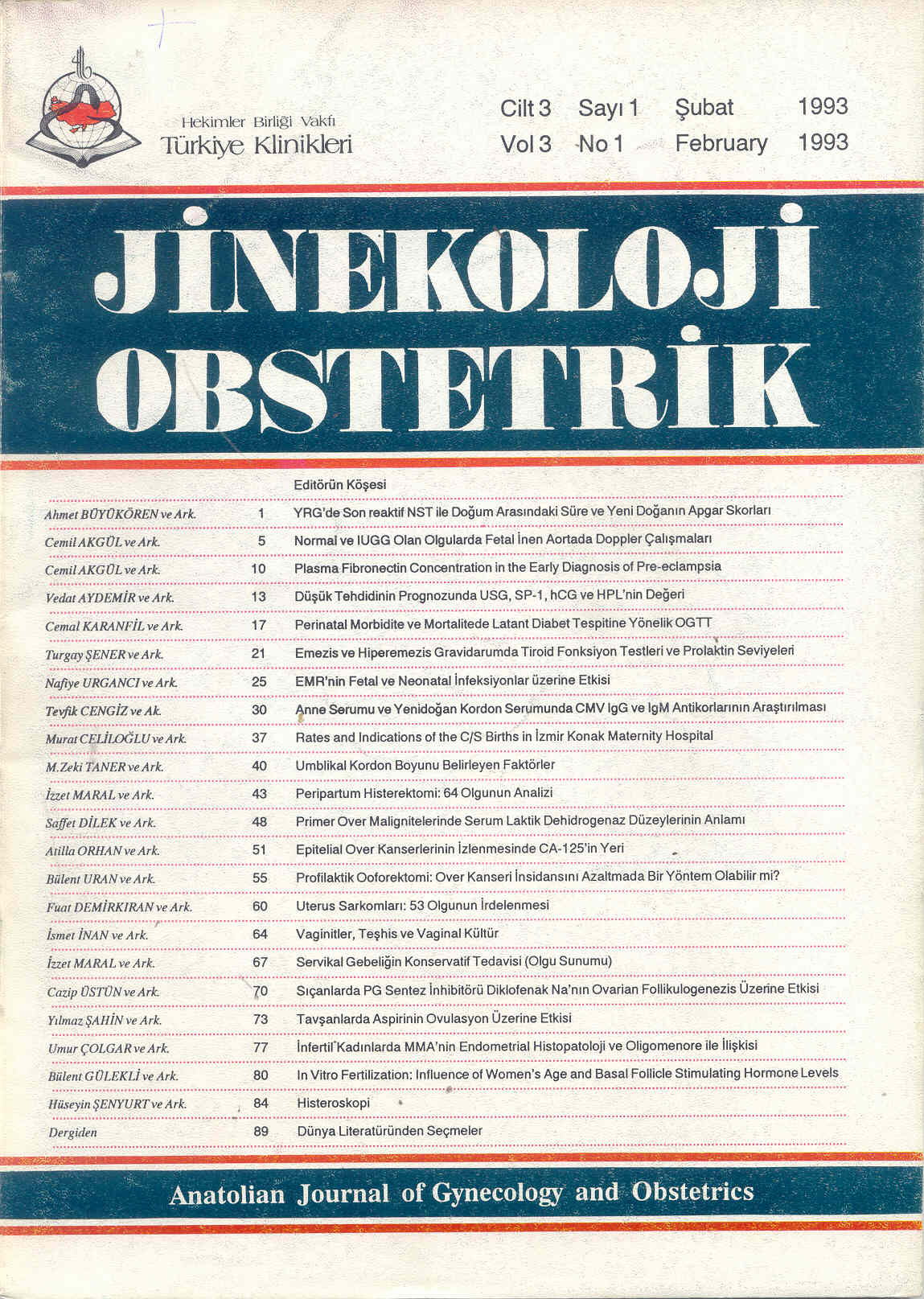Open Access
Peer Reviewed
ARTICLES
3792 Viewed1138 Downloaded
Fetal Doppler Velocity Waveform Studies In The Fetal Descending Aorta In Normal And Growth Retarded Pregnancies
Normal ve İntrauterin Gelişme Geriliği Olan Olgularda Fetal İnen Aortada Doppler Çalışmaları
Turkiye Klinikleri J Gynecol Obst. 1993;3(1):5-9
Article Language: TR
Copyright Ⓒ 2025 by Türkiye Klinikleri. This is an open access article under the CC BY-NC-ND license (http://creativecommons.org/licenses/by-nc-nd/4.0/)
ÖZET
30 ile 42. gebelik haftaları arasındaki 15 normal ve 24 intrauterin gelişme geriliği olgusunda 118 adet Doppler hız dalga çalışması yapılmıştır. Hız dalga şekline ve pulsalite indekse göre yapılan sınıflama sonucunda, fetal distres gelişen 16 olgunun 13'ünde (%81.2) anormal kan akımı hızı saptanmıştır. Pulsalite indeks ise 16 olgunun yalnız 10'unda (%62.5) yüksek bulunmuştur. Kan akım sınıflamasında III. Derecede bulunan 3 olgu intrapartum ex olmuştur. Böylece; intrauterin gelişme geriliği olgularında aorta kan akım ortalama hızında azalma olduğu ve pulsalite indekste yükselme olduğu görülmüştür. İntrauterin gelişme geriliği olan ve Doppler dalga formunda diastolik bölümünün kaybolduğu olguların, yeterli kan dolaşımını sağlayamayan ağır risk altındaki hipoksik bir fetus olabileceği ve bu durumda da prognozun kötü olduğu saptanmıştır.
30 ile 42. gebelik haftaları arasındaki 15 normal ve 24 intrauterin gelişme geriliği olgusunda 118 adet Doppler hız dalga çalışması yapılmıştır. Hız dalga şekline ve pulsalite indekse göre yapılan sınıflama sonucunda, fetal distres gelişen 16 olgunun 13'ünde (%81.2) anormal kan akımı hızı saptanmıştır. Pulsalite indeks ise 16 olgunun yalnız 10'unda (%62.5) yüksek bulunmuştur. Kan akım sınıflamasında III. Derecede bulunan 3 olgu intrapartum ex olmuştur. Böylece; intrauterin gelişme geriliği olgularında aorta kan akım ortalama hızında azalma olduğu ve pulsalite indekste yükselme olduğu görülmüştür. İntrauterin gelişme geriliği olan ve Doppler dalga formunda diastolik bölümünün kaybolduğu olguların, yeterli kan dolaşımını sağlayamayan ağır risk altındaki hipoksik bir fetus olabileceği ve bu durumda da prognozun kötü olduğu saptanmıştır.
ANAHTAR KELİMELER: İntrauterin gelişme geriliği, doppler hız dalga formu, pulsalite indeks
ABSTRACT
118 fetal Doppler velocity waveform studies were designed on 15 normal and 24 growth retarded pregnancies between weeks 30 to 42. According to the classification with velocity waveforms and pulsality index; 13 abnormal blood flow cases were established among 16 cases (81.2%) and pulsality index was found to be high in 10 cases (62.5%). Intrapartum exitus lethalis was seen in 3 cases with a III. Degree blood flow measurement. Thus, fetal aortic blood flow mean velocity rate was found to decreased and pulsality index increased in pregnancies complicated with intrauterin growth retardation. It was established in this study that, the disappearance of diastolic component in Doppler waveform in growth retarded cases might deal with a hypoxemic fetus at high risk, so the prognosis might be worse, either.
118 fetal Doppler velocity waveform studies were designed on 15 normal and 24 growth retarded pregnancies between weeks 30 to 42. According to the classification with velocity waveforms and pulsality index; 13 abnormal blood flow cases were established among 16 cases (81.2%) and pulsality index was found to be high in 10 cases (62.5%). Intrapartum exitus lethalis was seen in 3 cases with a III. Degree blood flow measurement. Thus, fetal aortic blood flow mean velocity rate was found to decreased and pulsality index increased in pregnancies complicated with intrauterin growth retardation. It was established in this study that, the disappearance of diastolic component in Doppler waveform in growth retarded cases might deal with a hypoxemic fetus at high risk, so the prognosis might be worse, either.
MENU
POPULAR ARTICLES
MOST DOWNLOADED ARTICLES





This journal is licensed under a Creative Commons Attribution-NonCommercial-NoDerivatives 4.0 International License.










